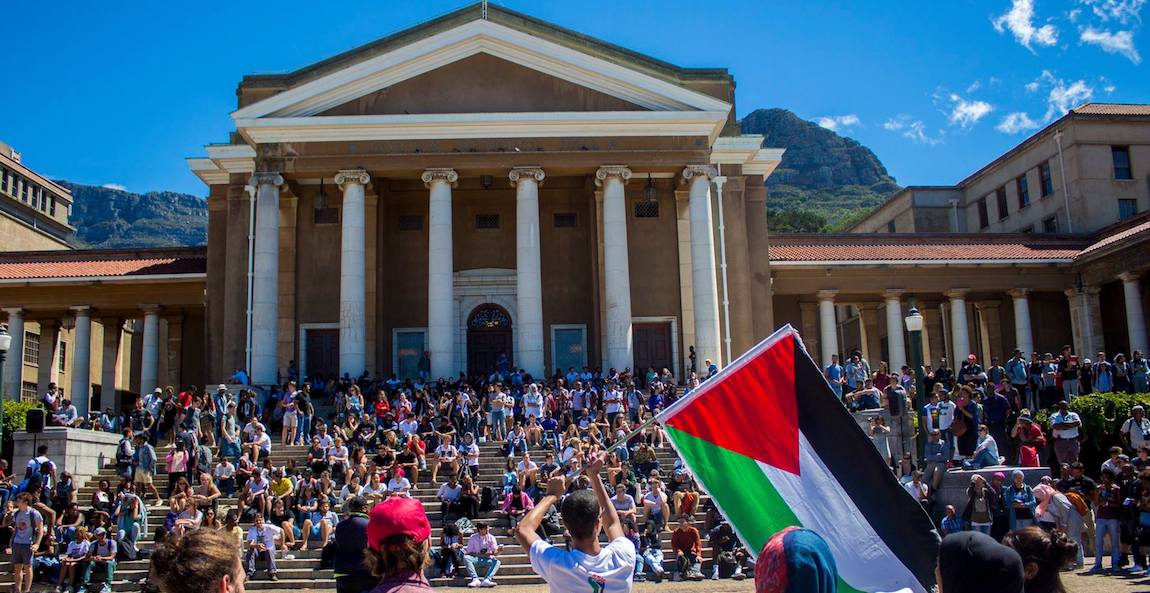The University of Cape Town (UCT), one of the continent’s most prestigious universities, is one step closer to implementing a boycott against Israel. Last week, UCT’s Senate voted in favour of a proposal for the tertiary institution to not enter into any formal relationships with Israeli academic institutions operating in the occupied Palestinian territories as well as other Israeli academic institutions “enabling gross human rights violations in the occupied Palestinian territories.” The decision was passed in the Senate with 62 in favour, 43 against and 10 abstentions. In order for this to become an official university policy, the council must vote on the decision on 30th March.
The South African Union of Students (SAUS), representing all student representative bodies in South Africa, BDS South Africa and Sasco, have welcomed the decision.
“SAUS commends the students, academics, activists of the UCT PSF and all others who have for the last two years worked tirelessly on this campaign at UCT. Indeed, international solidarity once assisted us in our liberation and so we have an obligation to stand with those who stood with us like the Palestinians, Cuban and all oppressed peoples,” it said in a statement.
UCT has joined the ranks of other universities, academic bodies and student governments globally, who are adopting measures in support of the academic boycott of Israel. In 2011 the University of Johannesburg (UJ) terminated relations with Israel’s Ben Gurion University and in 2017 Tshwane University of Technology (TUT) adopted the academic boycott of Israel. In 2014 the Minister of Higher Education called on all institutions of higher to adopt an academic boycott of Israel.
However, there remains a deluge of criticism around the talk of a boycott. Sara Gon, a policy fellow at the Institute for Race Relations (IRR) believes any such resolution will create major challenges for UCT.
“Jewish support of UCT will virtually disappear and it is already tenuous. They say that when a country loses its Jews, it fails. It’s the same with universities. If you look at the number of South African Nobel Prize winners that went to UCT and were Jewish – that will never happen again,” she was quoted in the South Africa Jewish Report.
“It will have a major problematic effect in relationships with universities in America. Boycotts have not succeeded there, despite much more consistent and formal efforts.”
Rael Kaimowitz, the chairperson of the South African Jewish Board of Deputies’ Cape council, called the senate’s decision “grossly discriminatory”.
“Why should UCT have chosen to single out Israeli universities when there are territorial disputes around the world, and countries with appalling human rights records about whom nothing is said?”
But the SAUS has hit back, saying the Israeli lobby has been “caught flat-footed using two baseless and tired arguments against UCT.” The suggestion that the institution will drop in international standing and lose funding has no merit, it said.
SAUS said that following UJ’s adoption of the academic boycott, between 2011 and this year, UJ has advanced to the top 2.3% of universities globally and has moved into fifth position nationally.
“UJ has climbed an astounding 60 places, breaking into the top 500 in the world, in between 2011 and today. In TUT’s case, following the decision to boycott Israel, TUT was ranked for the first time among the top 1 000 universities globally, and has further been ranked #9 among the top 10 universities in South Africa. It also remains the number one university of technology in Africa,” SAUS explained.
In terms of funding, UJ has steadily increased its funding since its stance in support of the Palestinian boycott of Israel.
“For example, just three years ago UJ ran one of the biggest fundraising campaigns ever undertaken by a South African institution of higher learning and raised close to R90 million for students,” said the SAUS.
The academic boycott is well supported among South African academics. In 2011 a petition in support of the academic boycott gained unprecedented support of over 400 South African academics, including nine South African Vice-Chancellors and Deputy Vice-Chancellors; 11 Deans and Vice Deans; 19 Heads of Department; 175 University Professors and 125 Academic Doctorates. Included in the list of supporters were some of South Africa’s leading voices and anti-apartheid stalwarts: Professors Neville Alexander, Kader Asmal, Allan Boesak, Breyten Breytenbach, John Dugard, Antjie Krog, Rashida Manjoo, Barney Pityana and Sampie Terreblanche.
In 2016 several academics pulled out of a Genocide Conference that was being hosted in Israel – among those who withdrew, to the embarrassment of the Israeli organizers, included the Vice President of the International Network of Genocide Scholars (INoGS) who hails from South Africa. Last year, following an outcry from South African civil society, seven Israelis withdrew from an academic conference at Stellenbosch University.
VOC






 WhatsApp us
WhatsApp us 

